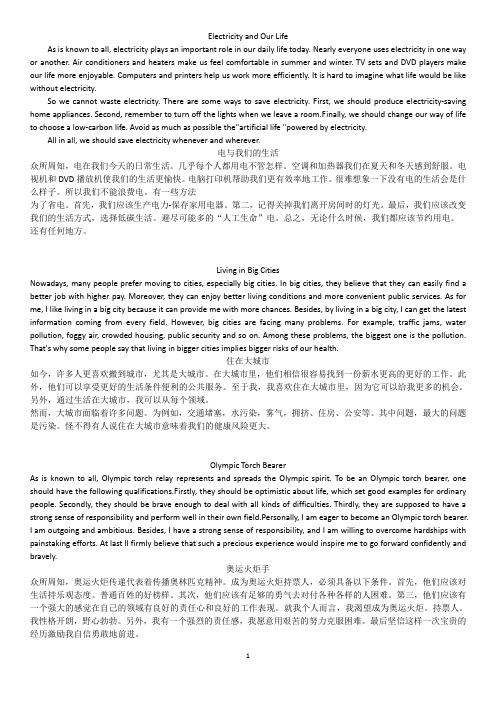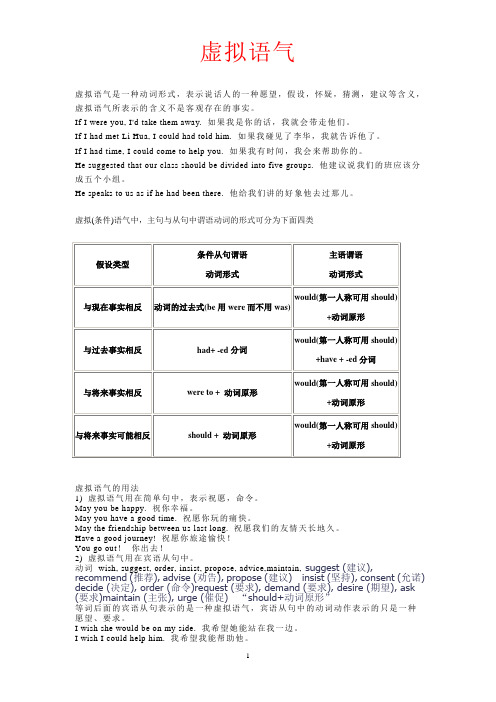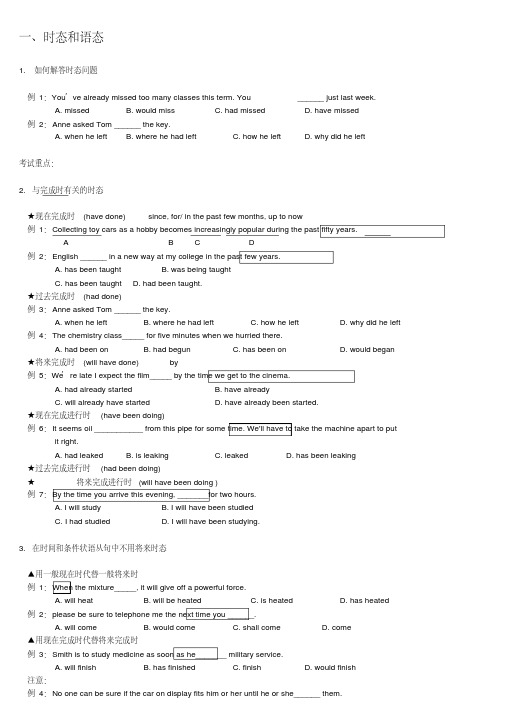学位英语复习资料
学位英语作文复习资料

Electricity and Our LifeAs is known to all, electricity plays an important role in our daily life today. Nearly everyone uses electricity in one way or another. Air conditioners and heaters make us feel comfortable in summer and winter. TV sets and DVD players make our life more enjoyable. Computers and printers help us work more efficiently. It is hard to imagine what life would be like without electricity.So we cannot waste electricity. There are some ways to save electricity. First, we should produce electricity-saving home appliances. Second, remember to turn off the lights when we leave a room.Finally, we should change our way of life to choose a low-carbon life. Avoid as much as possible the"artificial life "powered by electricity.All in all, we should save electricity whenever and wherever.电与我们的生活众所周知,电在我们今天的日常生活。
电大学位英语复习资料

电大学位英语复习资料电大学位英语复习资料英语是按照分布面积而言最流行的语言,但母语者数量是世界第三,仅次于汉语、西班牙语。
它是学习最广泛的第二语言,是近60个主权国家的官方语言或官方语言之一。
下面是店铺精心整理的电大学位英语复习资料,仅供参考,欢迎大家阅读。
形容词的`顺序:系动词be, grow, get, become, feel, appear, prove, seem, look, keep, smell, taste, sound, turn, remain限定词+数量形容词(序数词在前,基数词在后)+性状形容词+大小、长短、高低等形体+新旧+颜色+国藉+材料Those three beautiful large square old brown wood table某些以a-开首的形容词例如:afraid, alike, alone, asleep, awake, alive 等只能作表语,不能作定语。
某些以-ly结尾的词是形容词而不是副词:friendly, lively, lovely, lonely, likely, deadly, silly, orderly, timely等。
1)close接近地 closely仔细地,密切地2)free 免费地 freely自由地,无拘束地3)hard努力地 hardly几乎不4)late 晚,迟 lately 近来5)most 极,非常 mostly主要地6)wide广阔地,充分地 widely广泛地7)high高 highly高度地,非常地8)deep深,迟 deeply抽象意义的“深”9)loud大声地 loudly大声地(含有喧闹的意思)10)near邻近 nearly几乎bad/ill,badly worse worst little less least表示一方不及另一方时,用“less+原级+than”的结构表示:This room is less beautiful than that one.表示一方超过另一方的程度或数量时,可在比较级前加表示程度的状语,如:even, a lot, a bit, a little, still, much, far, yet, by far等修饰:He works even harder than before.注意:by far 通常用于强调最高级。
学位英语复习资料

一、学位英语词汇部分答题技巧词汇试题的正确选择在很大程度上取决于考生词汇量的大小,以及运用词汇能力的强弱。
但是了解一些解题技巧也会对考试有一定的帮助。
下面简单介绍几种词汇测试题中常见的应试技巧。
一、词组与习惯用法辨析题1)动词短语搭配英语动词短语是英语的难点之一,它是由动词+副词、动词+介词、动词+副词+介词几种方式构成的惯用组合,具有自己独特的意义。
其意义、语法、用法等常使考生感到困难。
首先,动词短语的词义不是动词和副词、介词等小品词的简单组合,往往难以从字面上理解。
其次,动词短语的使用场合及范围不易弄清楚。
第三,同义、近义和反义的动词短语容易混淆。
要学好英语,必须学会使用动词短语。
测试动词短语的题目在词汇题中占有很大的比例,其目的是测试考生辨别和运用动词短语,尤其是同一动词所构成的不同动词短语的能力。
eg. The car won’t start because the battery was _______ .A. run up B。
run down C。
run off D。
run over答案B.这是一个因果关系的句子。
“汽车为什么发动不起来?”原因是“电池电力不足或没有了”。
另外,我们注意到有系动词的搭配,表明四个词组要取及物动词的意义,这样才能构成被动语态。
四个选项中,只有run down有“使电用完"之意,其它三个选择项与本句意思不合。
run up表示“增长、积欠”,run off做及物动词时表示“快速打印出或写出”;run over“碾过、轧过”。
如果考生掌握了这四个动词短语的含义,就会作出正确的选择了.2)习惯用语题英语习语(English idiom)具有特有的、约定俗成的结构形式,如“步行”,可说on foot,不说by foot,而“乘车”要说by bus,不说on bus。
再如anything but 与nothing but两个词组意义完全不同anything but的基本意思是not at all,而nothing but的基本意思是only.英语中的习语令人眼花缭乱,其构成形式有的甚至无规律可循。
《成人学士学位英语》复习资料

《成人学士学位英语》复习资料《成人学士学位英语》复习资料主要以下面内容,结合课本复习。
注意:考试时一定要随身带大学英语5《综合练习习题与解答》一、考试复习范围(重点注意有下画线的内容) ((((((((((((1) 选择词汇范围:其中两个练习(p222 exercise one; p225 exercise two;p229 exercise three ;p233 exercisefour; p236 exercise five ;p240 exercise six)(2)阅读理解和翻译阅读理解范围:(p296 exercise six、p301 exercise Seven、以及大学英语5《综合练习习题与解答》中的阅读理解练习题第11、12。
)翻译范围:英译汉(上述六个阅读理解练习后的part II Sentence Translation) (3) 完型填空范围:两篇中选一篇(p350 exercise three; p351 exercise four; 以及大学英语5《综合练习习题与解答》中的完型填空练习题第4、5 。
)(4)作文重点注意P370 exercise Ten; p370 exercise Nine(注意exercise one ---exercise seventeen 都留意一下)二、复习重点讲解(1) 词汇练习一p2221(D avoid为“避免”,avoid doing something 避免做某事; 2. C diversion为:“转移”,a diversion of attention 转移注意力; 3(A identity 为:“辨别”。
4(C suggestion 为“建议”。
5(B derive something from something 从某物中剥夺某物; 6(D as far as I’m concerned 就我所知;7(A related to … 与…相关;8(D transfer something to something 把某物转移成某物; 9(B extend to… 扩展到…;10. D available… 存在的;11. B stage 展出;12(A access 路径;13(B worthwhile 值得的;14(D remind somebody of something 提醒某人某事;15(D considerate 体贴的;16(C bump my head against 把头撞到;17(A chance 机会;18(D previous 之前的,以前的;19(C be absorbed to do something 被吸引做某事;20(C be focused on something 被集中于某事;21(B all of a sudden 突然;22(A get about something 传播;流传; 23(D a narrow escape from death 狭窄的逃生路径;24(C now that 既然;25(B vigorous 充满活力的;26(B suppose 假设;27(D puzzle 难题;28(A mark 做记号;29(B get on with somebody 与某人相处; 30(B set about doing something 着手做某事; 31(B take somebody’s place 代替某人 32(A childish 幼稚的;33(C enjoy something from doing something 从做某事当中享受做某事;34(B favorite 最喜爱的;35(C violence 暴力;36(B hit somebody in the head 撞击某人头部; 37(A except 除了…之外;38(D resort to something 诉诸于某事; 39(C be neglected 被忽视;40(D survive 在…中生存;41(C catch sight of … 看到;42(B compliment 赞美,恭维; 43(B look into… 研究,调查; 44(D comfort 安慰;45(D be interrupted 被打扰;46(C minor 次要的;47(D declare 宣布;48(A take advantage of … 利用; 49(D 启程,出发;50(A 出发,动身;51(B pick up 挑选出;52(C likely 有可能的;53(C expect 期待;54(B lead to… 导致;55. D sensitive 敏感的;56. B be apt to … 易于…57. C spoil 溺爱;58( A alike 相似的;59( B contact 联系;60( B be conscious of… 意识到。
学位英语复习资料

虚拟语气虚拟语气是一种动词形式,表示说话人的一种愿望,假设,怀疑,猜测,建议等含义,虚拟语气所表示的含义不是客观存在的事实。
If I were you, I'd take them away. 如果我是你的话,我就会带走他们。
If I had met Li Hua, I could had told him. 如果我碰见了李华,我就告诉他了。
If I had time, I could come to help you. 如果我有时间,我会来帮助你的。
He suggested that our class should be divided into five groups. 他建议说我们的班应该分成五个小组。
He speaks to us as if he had been there. 他给我们讲的好象他去过那儿。
虚拟(条件)语气中,主句与从句中谓语动词的形式可分为下面四类虚拟语气的用法1) 虚拟语气用在简单句中,表示祝愿,命令。
May you be happy. 祝你幸福。
May you have a good time. 祝愿你玩的痛快。
May the friendship between us last long. 祝愿我们的友情天长地久。
Have a good journey! 祝愿你旅途愉快!You go out!你出去!2) 虚拟语气用在宾语从句中。
动词wish, suggest, order, insist, propose, advice,maintain, suggest (建议), recommend (推荐), advise (劝告), propose (建议)insist (坚持), consent (允诺) decide (决定), order (命令)request (要求), demand (要求), desire (期望), ask (要求)maintain (主张), urge (催促) “should+动词原形”等词后面的宾语从句表示的是一种虚拟语气,宾语从句中的动词动作表示的只是一种愿望、要求。
湖南成人学士学位英语考试复习资料大全

一、时态和语态1.如何解答时态问题例1:You’ve already missed too many classes this term. You ______ just last week.A. missedB. would missC. had missedD. have missed例2:Anne asked Tom ______ the key.A. when he leftB. where he had leftC. how he leftD. why did he left考试重点:2. 与完成时有关的时态★现在完成时 (have done) since, for/ in the past few months, up to now例1:Collecting toy cars as a hobby becomes increasingly popular during the past fifty years.A B C D例2:English ______ in a new way at my college in the past few years.A. has been taughtB. was being taughtC. has been taughtD. had been taught.★过去完成时 (had done)例3:Anne asked Tom ______ the key.A. when he leftB. where he had leftC. how he leftD. why did he left 例4:The chemistry class_____ for five minutes when we hurried there.A. had been onB. had begunC. has been onD. would began ★将来完成时 (will have done) by例5:We’re late I expect the film_____ by the time we get to the cinema.A. had already startedB. have alreadyC. will already have startedD. have already been started.★现在完成进行时 (have been doing)例6:It seems oil ___________ from this pipe for some time. We'll have to take the machine apart to put it right.A. had leakedB. is leakingC. leakedD. has been leaking★过去完成进行时 (had been doing)★将来完成进行时(will have been doing )例7:By the time you arrive this evening, _______for two hours.A. I will studyB. I will have been studiedC. I had studiedD. I will have been studying.3. 在时间和条件状语从句中不用将来时态▲用一般现在时代替一般将来时例1:When the mixture_____, it will give off a powerful force.A. will heatB. will be heatedC. is heatedD. has heated例2:please be sure to telephone me the next time you ______.A. will comeB. would comeC. shall comeD. come▲用现在完成时代替将来完成时例3:Smith is to study medicine as soon as he_______ military service.A. will finishB. has finishedC. finishD. would finish注意:例4:No one can be sure if the car on display fits him or her until he or she______ them.A. triesB. will tryC. are tryingD. have tried4. 考试小窍门◆考试中如果遇到与完成时态相关的选项,要重点加以研读,一般说来是正确答案。
学位英语复习资料:介词
学位英语复习资料:介词1.be + adj. + prep.be good at, be afraid of, be anxious about (of), be kind to, be fit for, etc. 2. be + v.-ed + prep.be satisfied with, be worried about, be surprised at, be pleased at (by)3. v. + prep.agree with (to / on), apologize for, arrive at (in), believe in, depend on4. v. + n. + prep.pay attention to, take part in, make use of, have a word with5. v. + adv. + prep.go on with, go in for, go ahead with, keep up with, make up for6. prep. + n. + prep.in charge of, in time of, in place of, on top of, at the end (edge) of7. out of + n.out of breath, out of control, out of date, out of sight, out of work (order) 8. n. + after + n.hour after hour, year after year, battle after battle, defeat after defeat9. n. + by + n.step by step, side by side, one by one10. n. + to + n.face to face, heart to heart11. n. + in + n.hand in hand, arm in arm12. from + n. + to + n.from side to side, from place to place, from door to door13. a + n. + ofa bit of, a great deal of, a few of, a drop of, a line of14. with + n.with a long history, with satisfaction (care), with pleasure, with one’s help 15. on + n.on a trip (journey), on a visit (to), on fire, on business, on sale, on watchon the team, on show, on duty, on foot16. without + n.without help, without mercy, without delay17. in + n.in silence, in danger (trouble, surprise, fear), in high spirits, in love (return) 18.as + n.as a matter of fact, as a rule, as a whole19. by + n.by now (then), by hand, by mistake, by this means, by chance, by the year 20. at + n.at sea, at sunset, at Christmas, at the doctor’s, at the station, at a time 21. for + n.for a moment, for a time, for ever, for example22. to + n. (…+ to )to one’s delight (joy, surprise), to the east (west), to the right, due to,thanks to, according to, to this dayEXERCISE 1 (单选)1. The home improvements have taken what little there is my sparetime. A. from B. in C. of D. at2. Nobody noticed the thief slip into the house because the lights happenedto . A. be put up B. give in C. be turned on D. go out3. Would you slow down a bit, please ? I can’t you.A. keep up withB. put up withC. make up toD. hold on to4. Your performance in the driving test didn’t reach the required standard--- , you failed. A. in the end B. after allC. in other wordsD. at the same time5. production up by 60%, the company has had another excellentyear. A. As B. For C. With D. Through6. She his number in the phone book to make sure that she had got itright. A. looked up B. looked for C. picked out D. picked up7. I don’t think I’ll need any money but I’ll bring some .A. at lastB. in caseC. once againD. in time (CDACCAB)8.The train leaves at 6:00 pm. So I have to be at the station 5:40 pmat the least. A. until B. after C. by D. around9. You’d better some money for special use.A. pick upB. set asideC. put offD. give away10. Readers can quite well without knowing the exact meaning ofeach word. A. get over B. get in C. get along D. get through11. If you keep on , you’ll succeed . A. in timeB. at one timeC. on the same timeD. on time12. We offered him our congratulations his passing the collegeentrance exams. A. at B. on C. for D. of13.--- Will somebody go and get Dr. White ? ---He’s already been .A. asked forB. sent forC. called forD. looked for14. I was tired climbing up the mountain, and I am tired havingthe same food every day.A. from, ofB. of, atC. in, ofD. at, with15. Rose was wild with joy the result of the examination.A. toB. atC. byD. as (CBCABBAC) EXERCISE 2 (改错,每句一错)1.There are some monkeys on anapple tree on which there are many apples.( in an apple tree)2. Water usually freezes when temperature is under zero and ice changesinto water again when the temperature rises above zero. (below zero) 3. Mr. Smith asked the students to retell the story with their own words.( in their words)4. In the end he told us the key to his success by winning the first prize.(in winning)5. Taiwan is in the east of Fujian and in the southeast of China. (to the east)6.In reaching the village, we were warmly welcomed by the villagers.(On reaching)7. The two girls were in the same age. (at the same)8. He drove away to the direction of London. ( in the direction)9. We shouldn’t judge a person with his looks and clothes. (by his looks)10. She has been teaching in this school from 1960. (since 1960)。
学位英语考试复习资料
学位英语考试复习资料学位英语考试复习资料学位英语考试是许多大学生必须面对的一项考试。
它的重要性不言而喻,因为它直接关系到我们是否能够顺利毕业。
为了应对这个考试,我们需要准备充分的复习资料。
本文将介绍一些有效的学位英语考试复习资料,帮助大家更好地备考。
首先,阅读材料是学位英语考试中不可或缺的一部分。
通过大量的阅读可以提高我们的词汇量和阅读理解能力。
为了备考,我们可以选择一些经典的英文小说、报纸和杂志作为阅读材料。
例如,我们可以选择《麦田里的守望者》、《纽约时报》和《国家地理杂志》等。
这些材料既能够提高我们的英语水平,又能够为我们的写作和口语提供素材。
其次,听力材料也是学位英语考试中的一项重要内容。
通过大量的听力练习,我们可以提高自己的听力理解能力和口语表达能力。
为了备考,我们可以选择一些英语电影、英语新闻和英语广播作为听力材料。
例如,我们可以选择《泰坦尼克号》、BBC新闻和VOA英语广播等。
这些材料不仅能够帮助我们熟悉英语的语音和语调,还能够提高我们的听力技巧。
除了阅读和听力材料,写作材料也是学位英语考试中的一项重要内容。
通过大量的写作练习,我们可以提高自己的写作能力和语法水平。
为了备考,我们可以选择一些英语写作指导书和写作范文作为写作材料。
例如,我们可以选择《大学英语写作教程》和一些英语写作网站上的范文。
这些材料不仅能够帮助我们提高写作的技巧,还能够为我们的写作提供一些好的句子和表达方式。
最后,口语材料也是学位英语考试中的一项重要内容。
通过大量的口语练习,我们可以提高自己的口语表达能力和语音准确性。
为了备考,我们可以选择一些英语口语教材和口语练习题作为口语材料。
例如,我们可以选择《英语口语速成》和一些英语口语网站上的练习题。
这些材料不仅能够帮助我们提高口语的流利度,还能够为我们的口语提供一些常用的口语表达。
综上所述,学位英语考试复习资料的选择非常重要。
通过选择适合自己的阅读、听力、写作和口语材料进行复习,我们可以更好地备考并取得好成绩。
北京学位英语复习资料
北京学位英语复习资料北京学位英语复习资料随着全球化的发展,英语已经成为了一门必备的语言技能。
在中国,学位英语考试已经成为了大多数大学生的必修课。
而对于即将参加北京学位英语考试的考生来说,复习资料的选择和使用就显得尤为重要了。
本文将为大家介绍一些适合北京学位英语考试的复习资料。
首先,词汇是学位英语考试的重点内容之一。
为了提高词汇量,考生可以选择使用《牛津高阶英汉双解词典》或者《柯林斯高阶英汉双解词典》等权威词典进行学习。
这些词典不仅提供了详细的词义解释,还有例句和用法说明,对于考生来说非常实用。
此外,还可以利用手机应用程序,如“扇贝单词”、“Quizlet”等,通过刷单词卡片的方式来提高词汇记忆。
其次,阅读理解是学位英语考试中的另一个重点。
为了提高阅读理解能力,考生可以选择阅读一些英文报纸、杂志或者小说,如《纽约时报》、《经济学人》、《哈利·波特》等。
同时,还可以选择一些专门的阅读训练资料,如《剑桥雅思阅读真题精讲》、《新东方学位英语阅读》等。
这些资料不仅提供了大量的阅读材料,还有详细的解析和练习题,对于考生来说非常有帮助。
再次,写作是学位英语考试中的一项重要内容。
为了提高写作能力,考生可以选择一些写作指导书籍,如《英语写作与翻译实践》、《新东方学位英语写作》等。
这些书籍不仅提供了写作技巧和范文,还有练习题和写作任务,对于考生来说非常实用。
此外,还可以参加一些写作培训班或者网上写作课程,通过模仿和实践来提高写作水平。
最后,口语是学位英语考试中的一项重要内容。
为了提高口语表达能力,考生可以选择一些口语训练资料,如《剑桥雅思口语真题精讲》、《新东方学位英语口语》等。
这些资料不仅提供了口语练习题和范文,还有口语技巧和实用表达,对于考生来说非常有帮助。
此外,还可以参加一些口语培训班或者组织语言交流活动,通过与他人的交流来提高口语能力。
综上所述,北京学位英语考试的复习资料选择和使用对于考生来说至关重要。
学士学位英语复习资料
学士学位英语复习资料学士学位英语复习资料在如今的全球化时代,学士学位英语已经成为一项必备的能力。
无论是在求职市场上,还是在学术研究领域,拥有扎实的英语能力都是一个巨大的优势。
因此,为了帮助广大学生备考学士学位英语考试,本文将提供一些复习资料和学习方法。
首先,复习资料的选择至关重要。
学士学位英语考试通常包括听力、阅读、写作和口语四个部分。
对于听力部分,可以选择一些英语听力教材,如《剑桥雅思真题》或《托福听力》。
这些教材中包含了大量的听力材料和练习题,可以帮助学生提高听力理解能力。
对于阅读部分,建议选择一些英语原著小说或英语报刊杂志,如《纽约时报》或《经济学人》。
这些材料既能提高学生的阅读能力,又能增加学生对英语语言和文化的理解。
对于写作部分,可以参考一些写作指南和范文集,如《英语写作指南》或《英语写作范文精选》。
这些资料可以帮助学生提高写作技巧和写作水平。
对于口语部分,可以选择一些口语训练教材,如《托福口语》或《雅思口语》。
这些教材中包含了大量的口语练习题和口语技巧,可以帮助学生提高口语表达能力。
其次,学习方法也是复习学士学位英语的关键。
首先,要制定一个合理的学习计划。
根据自己的时间安排和学习进度,合理安排每天的学习时间和任务。
其次,要注重听说读写的综合训练。
学士学位英语考试不仅要求学生具备良好的听力和阅读理解能力,还要求学生能够流利地表达自己的思想和观点。
因此,在学习过程中,要注重听力和口语的训练,多听多说多练习。
同时,要注重阅读和写作的练习,多读多写多积累。
此外,要注重词汇和语法的学习。
学士学位英语考试中,词汇和语法是基础,也是重点。
因此,在学习过程中,要注重词汇和语法的学习,多做词汇和语法练习题,积累词汇和掌握语法规则。
最后,要注重模拟考试和反思总结。
学士学位英语考试是一场实战,只有通过不断的模拟考试,才能真正了解自己的水平和不足之处。
因此,在复习的过程中,要不断进行模拟考试,模拟真实考试环境,检验自己的学习成果。
- 1、下载文档前请自行甄别文档内容的完整性,平台不提供额外的编辑、内容补充、找答案等附加服务。
- 2、"仅部分预览"的文档,不可在线预览部分如存在完整性等问题,可反馈申请退款(可完整预览的文档不适用该条件!)。
- 3、如文档侵犯您的权益,请联系客服反馈,我们会尽快为您处理(人工客服工作时间:9:00-18:30)。
一般现在时 1)经常性或习惯性的动作,常与表示频度的时间状语连用。时间状语: every…, sometimes, at…, on Sunday。例如: I leave home for school at 7 every morning. 每天早上我七点离开家。 2)客观真理,客观存在,科学事实。例如: The earth moves around the sun. 地球绕太阳转动。 Shanghai lies in the east of China. 上海位于中国东部。 3)表示格言或警句。例如: Pride goes before a fall. 骄者必败。 注意:此用法如果出现在宾语从句中,即使主句是过去时,从句谓语也要用一般现在时。例:Columbus proved that the earth is round. 哥伦布证实了地球是圆的。 4)现在时刻的状态、能力、性格、个性。例如: I don't want so much. 我不要那么多。exam8.com Ann writes good English but does not speak well. 安英语写得不错,讲的可不行。 二、一般过去时 1)在确定的过去时间里所发生的动作或存在的状态。例如:时间状语有:yesterday, last week, an hour ago, the other day, in 1982等。例如: Where did you go just now? 刚才你上哪儿去了? 2)表示在过去一段时间内,经常性或习惯性的动作。例如: When I was a child, I often played football in the street. Whenever the Browns went during their visit, they were given a warm welcome. 那时,布朗一家无论什么时候去,都受到热烈欢迎。 3)句型:It is time for sb. to do sth "到……时间了" "该……了" 例如:It is time for you to go to bed. 你该睡觉了。 It is time that sb. did sth. "时间已迟了" "早该……了" 例如It is time you went to bed.你早该睡觉了。 would (had) rather sb. did sth. 表示'宁愿某人做某事'。 例如:I'd rather you came tomorrow.还是明天来吧。 三、一般将来时 1)shall用于第一人称,常被will 所代替。will 在陈述句中用于各人称,在征求意见时常用于第二人称。例如: Which paragraph shall I read first? 我先读哪一段呢? Will you be at home at seven this evening? 今晚七点回家好吗? 2)be going to +不定式,表示将来。 a. 主语的意图,即将做某事。例如:What are you going to do tomorrow? b. 计划,安排要发生的事。exam8.com 例如:The play is going to be produced next month。这出戏下月开播。 c. 有迹象要发生的事。 例如:Look at the dark clouds, there is going to be a storm. 看那乌云,快要下雨了。 3)be +to表将来,按计划或正式安排将发生的事。例如: We are to discuss the report next Saturday.我们下星期六讨论这份报告。 4)be about to +动词原形,意为马上做某事。例如: He is about to leave for Beijing. 他马上要去北京。 注意: 1、一般现在时表示将来 1)下列动词come, go, arrive, leave, start, begin, return的一般现在时可以表示将来,主要用来表示在时间上已确定或安排好的事情。例如: The train leaves at six tomorrow morning. 火车明天上午六点开。 When does the bus star? It stars in ten minutes. 汽车什么时候开?十分钟后。 2)在时间或条件句中。例如: When Bill comes (不是will come), ask him to wait for me. 比尔来后,让他等我。 I'll write to you as soon as I arrive there. 我到了那里,就写信给你。 2、用现在进行时表示将来 下列动词come, go, arrive, leave等现在进行时可以表示将来: I'm leaving tomorrow. 明天我要走了。 四、现在进行时 a. 表示现在(指说话人说话时)正在发生的事情。例如: We are waiting for you. 我们正在等你。 b. 习惯进行:表示长期的或重复性的动作,说话时动作未必正在进行。例如: Mr. Green is writing another novel. 他在写另一部小说。(说话时并未在写,只处于写作的状态。) c. 表示渐变,这样的动词有:get, grow, become, turn, run, go, begin等。例如: The leaves are turning red. 叶子在变红。 It's getting warmer and warmer. 天越来越热了。 d. 与always, constantly, forever 等词连用,表示反复发生的动作或持续存在的状态,往往带有说话人的主观色彩。例如: You are always changing your mind. 你老是改变主意。 五、过去进行时 过去进行时表示过去某一时间正在进行的动作,常和表过去的时间状语连用,如: I was doing my homework at this time yesterday.昨天的这个时候我正在做作业。 They were expecting you yesterday.他们昨天一直在等待。 难点释疑: when作并列连词,表示“(这时)突然”之意时,第一个并列分句用过去进行时,when引导的并列分句用一般过去时。如: . I was taking a walk when I met him.我正在散步,突然遇见了他。 We were playing outside when it began to rain.我们正在外边玩,这时下起雨来了。 六、将来进行时 1)表示将来某时进行的状态或动作,或按预测将来会发生的事情。例如: She'll be coming soon. 她会很快来的。 I'll be meeting him sometime in the future. 将来我一定去见他。 2)常用的时间状语有soon, tomorrow, this evening,on Sunday, by this time,tomorrow, in two days, tomorrow evening等。例如:By this time tomorrow, I'll be lying on the beach. 明天此时,我正躺在海滩上呢。 注意:“主将从现原则”,主句用将来时,从句用一般现在时(代替一般将来时) When, as soon as, if,等引导的时间状语从句,条件句中,用一般现在时代替将来时。例如: He is going to visit her aunt t when he arrives in Beijing. 他一到北京,就去看他姨妈。 七、现在完成时 a. 现在完成时可表示过去发生的动作对现在所产生的影响,后面通常不用时间状语,但句中常出现already, just,yet等副词。如: Someone has broken the window.有人把窗户打破了。 I’ve just finished reading the novel.我刚刚读完这本小说。 Have you seen the doctor yet?你看过医生了吗? 注:already和yet用法上的区别 already常用于肯定句,置于句中。yet常用于否定句和疑问句,常用于句末。但already有时也可用语疑问句中暗示惊讶的心情。如: b. 现在完成时也可表示从过去某时开始的动作,状态一直持续到现在,常和for, since引导的时间状语连用。 如: I have learned English for 5 years. He has lived in Beijing since he was born. 注: (1) for和since引导的时间状语的区别: for + 一段时间, since + 一点时间从句(从句中常用一般过去时)。 (2)表示继续的现在完成时也可和lately, recently, so far, up to now, till now, in the past(last) few years……, this week (month, year……), all day, all this week等时间状语连用。 如:Tom has had a toothache all day.I haven’t heard from him recently. (3)现在完成时也可表示从过去到现在曾经经历过或做过的事情,常和often, ever, never, before, once,…times等时间状语连用。如: .
